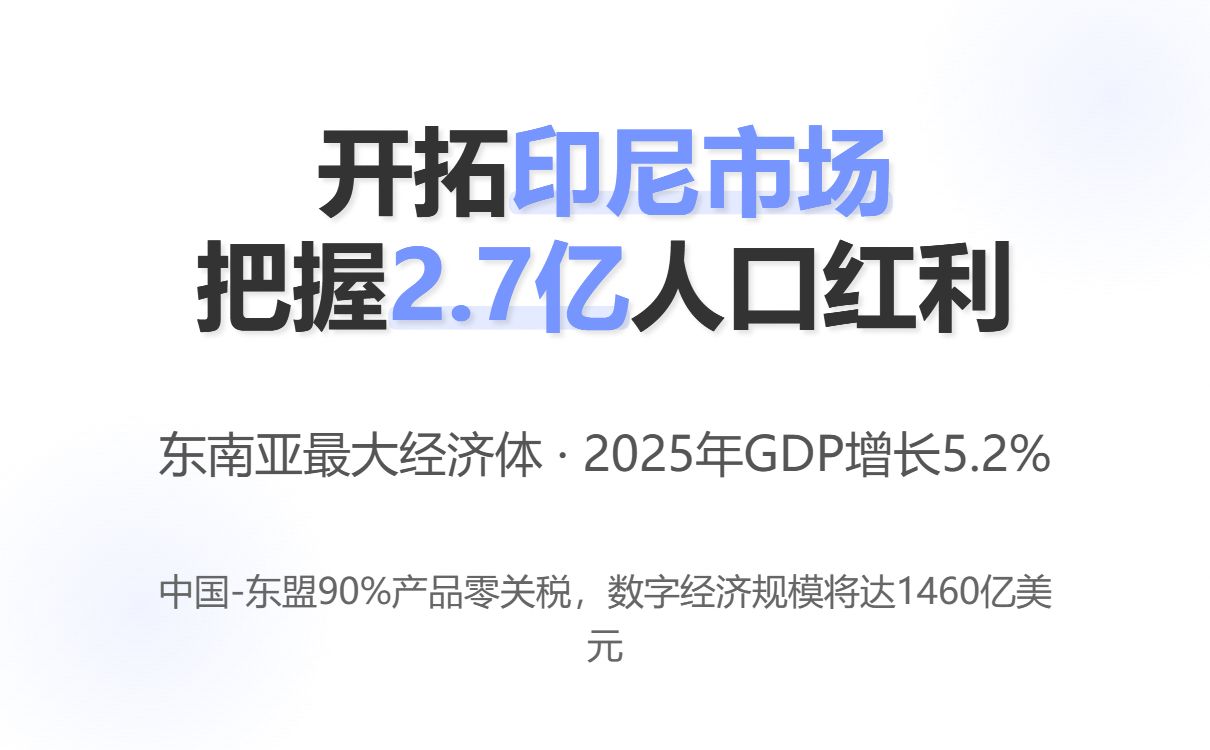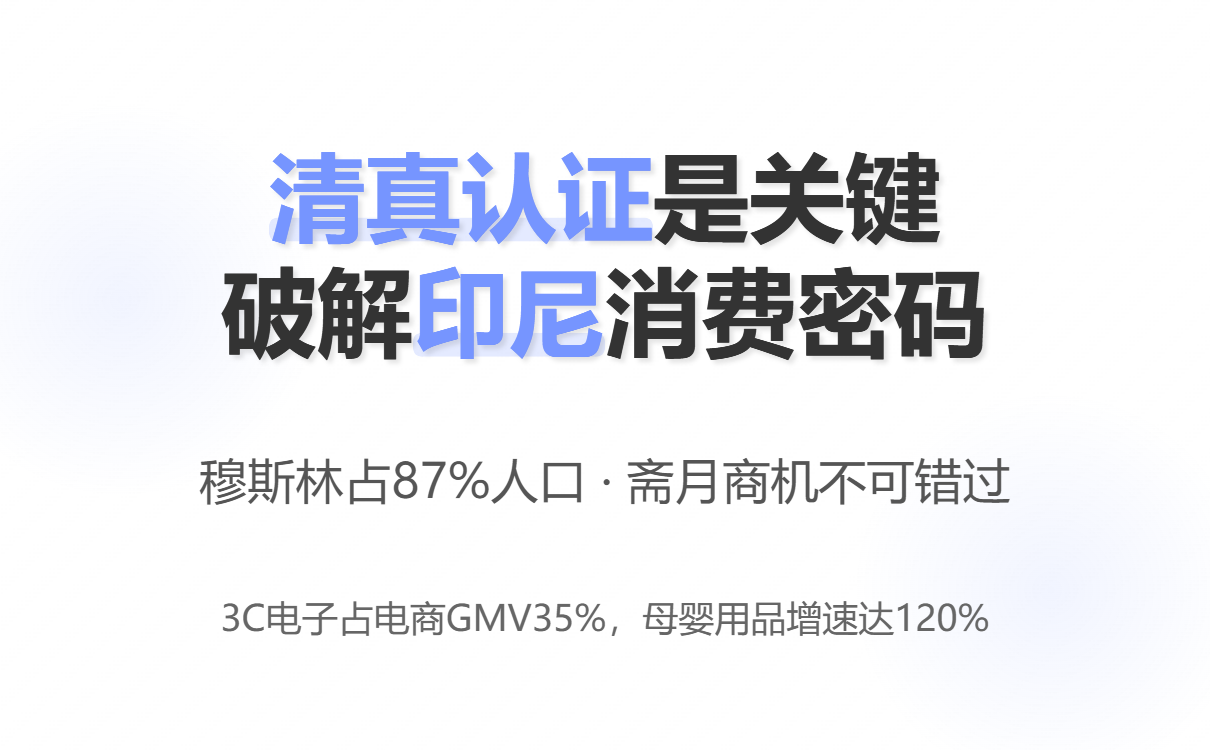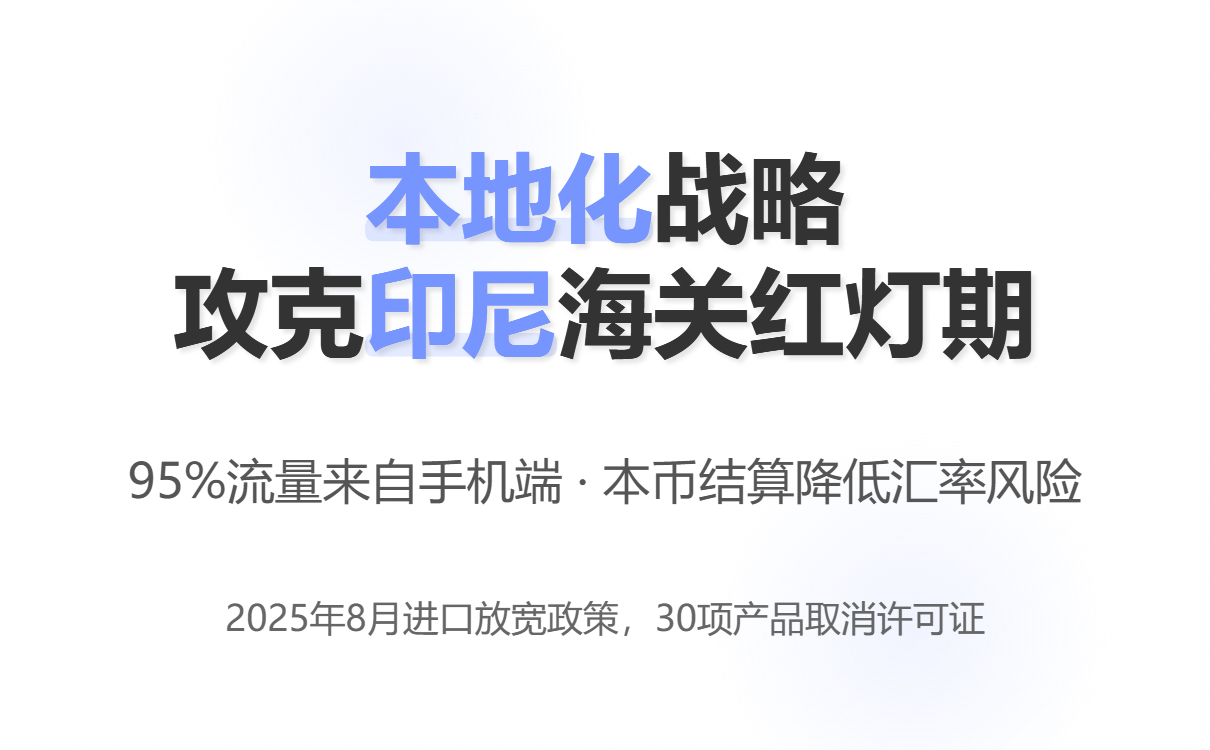 400-076-6558智领未来,外贸超级营销员
400-076-6558智领未来,外贸超级营销员
 400-076-6558智领未来,外贸超级营销员
400-076-6558智领未来,外贸超级营销员

As Southeast Asia's largest economy, Indonesia is becoming a top choice for an increasing number of Chinese companies seeking to expand internationally. This guide will provide comprehensive guidance for developing the Indonesian market.

Country name : Republic of Indonesia
Area : 1,904,569 square kilometers (the world's largest archipelago, consisting of more than 17,000 islands)
Population : approximately 270 million (the fourth most populous country in the world, with a high proportion of young people)
Religion : Islam (87%, the country with the largest Muslim population in the world), Christianity, Catholicism, Hinduism, Buddhism, etc.
Official language : Indonesian (Bahasa Indonesia)
Capital : Jakarta (President Prabowo continued to promote the new capital construction plan after taking office)
economy :
In the first quarter of 2024, GDP grew by 5.11% year-on-year, the highest growth rate in the same period since 2019.
The economic growth target for 2025 is 5.2%.
Per capita GDP is approximately US$4,800, and the middle class is rapidly expanding.
Resources : The world's largest nickel producer (production is expected to increase by 25%), rich in natural resources such as palm oil, rubber, and coal
Industry : Manufacturing accounts for about 9% of GDP, mainly involving textiles, electronics, automobile assembly, food processing, etc.
Agriculture and animal husbandry : Adoption of modern technology is expected to increase productivity by 15%
Services : The digital economy continues to expand and is expected to reach US$146 billion by 2025
Tourism : In the first five months of 2024, the cumulative number of foreign tourists increased by 23.78% compared with the same period last year
Foreign trade : China is Indonesia's largest trading partner, with 30% of exports going to China and 10% to the United States.
Foreign capital : Foreign direct investment as a percentage of GDP has returned to pre-pandemic levels
Favorable policies towards China :
The local currency settlement framework for bilateral transactions (LCT) was launched in September 2025, with local currency settlement reaching US$6.23 billion from January to July.
China-Indonesia cross-border QR code interconnection project launches two-way pilot
According to the China-ASEAN Comprehensive Economic Cooperation Framework Agreement on Trade in Goods, more than 90% of imports and exports between China and Indonesia have achieved zero tariffs.
China-Indonesia bilateral trade : China's exports to Indonesia have seen significant growth, including fish and crustaceans (over 100%), cocoa products (over 100%), coffee and tea (53.42%), etc.
Eid al-Fitr : Late March to early April (October 1st in the Islamic calendar, the date varies each year) - the most important festival, with a holiday lasting more than a week
Eid al-Adha : early June (10th day of the 12th month in the Islamic calendar)
Hindu New Year : March (Nyepi Day, an important festival in Bali)
Independence Day : August 17 (celebrates Indonesia's independence)
Christmas Day : December 25
Religious sensitivity : Avoid discussing religiously sensitive topics, especially those related to Islam
Left-hand taboo : Avoid handing things over or shaking hands with your left hand, as the left hand is considered unclean.
Respect for Ramadan : Avoid eating, drinking or smoking in front of Muslims during the Islamic holy month of Ramadan.
Dress appropriately : Dress conservatively in business settings and avoid revealing clothing
Address politely : Use "Bapak" (Mr.) or "Ibu" (Ms.) followed by the last name.
Gift-giving etiquette : Do not open gifts in front of others when you receive them, and avoid alcoholic beverages and pork products when giving gifts.
Negotiation patience : Business negotiations are slow and require building relationships and trust, avoiding rushing for results.
Stable economic growth : Indonesia's economy is expanding, with GDP projected to grow by 5.1% and 5.2% in 2024 and 2025, respectively, and inflation stable at 2.6%.
Consumer market expansion : The middle class is rapidly rising, spending power is increasing, and household consumption contributes significantly to the economy.
Digitalization is accelerating : The digital economy is expected to reach US$146 billion by 2025, with digital payments rapidly gaining popularity.
Policy support : After taking office, President Prabowo implemented positive economic policies and simplified regulatory procedures.
Demographic dividend : The young population accounts for a large proportion, the labor force is abundant, and domestic demand is the main driving force of economic growth, with a contribution rate of over 56%.
Infrastructure development : New capital construction, irrigation system improvement, and renewable energy projects continue to advance.
Price sensitivity and quality pursuit are equally important : Consumers are willing to pay more for long-lasting quality in technology consumer goods, as evidenced by the growth in sales of high-end smartphones. They also value value for money and use promotions to control their budgets.
Brand loyalty is highly malleable : In the fast-moving consumer goods sector, consumers are more experimental when shopping, buying more categories but fewer brands.
High digital acceptance : 95% of traffic comes from mobile phones, short video ads have high click-through rates, and digital payment usage is increasing.
Focus on relationship building : Trust must be established before business cooperation, and face-to-face communication is preferred.
Complex decision-making process : large enterprises have long decision-making chains and require patient follow-up
Religious influence : Halal certification is crucial for industries such as food and cosmetics

The following is a guide to selecting products with potential in the Indonesian market by 2025:
| Category | Specific products | Market Opportunities |
|---|---|---|
| 3C Electronics | Smartphones, tablet accessories, smart wearables | Accounting for 35% of e-commerce GMV, they are willing to pay more for quality |
| Maternal and child products | Baby clothing, care products, toys | Growth rate reaches 120%, focus on halal certification |
| Household items | Household appliances, kitchen utensils, decorations | Demand for Muslim household products increases by 25% annually |
| Beauty and Personal Care | Halal cosmetics, skincare products, and beauty tools | Search volume increased by 40% month-on-month, requiring halal certification |
| Clothing and Accessories | Muslim clothing and fashion accessories | Meet local religious and cultural needs, local supply chain is insufficient |
| Food and Beverage | Halal food, healthy snacks, and beverages | BPJPH Halal certification required (full mandate in October 2024) |
| Auto Parts | Motorcycle accessories, car decoration | Insufficient supply of auto and motorcycle parts |
| Sports and Outdoors | Sports equipment and outdoor products | Insufficient supply of sports and outdoor categories |
Bank transfer : the most traditional method, suitable for large-value B2B transactions
Local Currency Settlement Framework : The China-Indonesia bilateral local currency settlement framework (LCT) launched in September 2025 can reduce exchange rate risks
E-wallets : GoPay, OVO, DANA, etc. are popular, and Momo e-wallet penetration rate exceeds 40%.
QR code payment : China-Indonesia cross-border QR code interconnection project has launched a pilot
Cash on delivery : Still accounts for a certain proportion, especially in the e-commerce field, but the proportion has dropped to 25%
Letter of credit : commonly used in commodity trade, highly secure but with complex procedures
Trade Indonesia : Indonesian B2B platform
Indotrading.com : A well-known local B2B portal
Made-in-China.com : English version for the Indonesian market
Facebook/Instagram : Advertising and brand building, with Facebook usage at 92%.
TikTok : Livestreaming sales have high conversion rates, while collaboration costs for local influencers are relatively low.
LinkedIn : Professional development for Indonesian business executives
WhatsApp : The primary tool for daily communication and customer maintenance
Google.co.id : Dominance
Yahoo.com : Still used by some users
KADIN : The official website of the Indonesian Chamber of Commerce and Industry, where you can find certified companies
JETRO : Japan External Trade Organization database, with reliable Indonesian company information
Indonesian Customs official website : www.beacukai.go.id to check tariff information
Professional customs data service providers : such as AB Ke ( https://www.cnabke.com/customsData.html ), ImportGenius, etc.
Trade Expo Indonesia : Annual national comprehensive exhibition
Indonesia International Trade Fair : Jakarta International Expo
Industry professional exhibitions : such as Indonesian Building Materials Exhibition, Electronics Exhibition, etc.
China-ASEAN Preferential Certificate of Origin : A compliant China-ASEAN Free Trade Area Preferential Certificate of Origin (FORM E) must be used to apply for tariff reductions and exemptions.
Non-preferential Certificate of Origin : This certificate is used only to certify the origin of goods, but does not provide tariff reductions or exemptions. Recommended reading: The main challenges of SNI certification for tires and toys: Indonesian local testing and factory inspection requirements !
Notes :
Indonesian customs requires that if the same product has different models and specifications, the product data information must be entered separately
Need to ensure the certificate of origin information is accurate to avoid customs clearance problems
Apply for preferential certificates of origin through the China Council for the Promotion of International Trade or the customs

Contract signing
Production/stocking
Booking arrangements
Document preparation (invoice, packing list, certificate of origin, etc.)
customs declaration and inspection
Sea/Air Freight
Indonesian customs clearance
Delivery to customers
NPWP number : The consignee must provide a 16-digit NPWP number. When the consignee is TO ORDER\TO ORDER OF BANK, the notify party must provide the NPWP number.
HS code : 6-digit HS/HT CODE is required
Complete information : The shipper, consignee, notify party and other notify party must submit the complete company name, detailed address, contact number and email address
Indonesian customs will intensify inspections during certain periods each year (such as around Ramadan and at the end of the year), which is called the "red light period". Strategies for dealing with this are:
Prepare complete documents in advance
Ensure product descriptions and value declarations are accurate
Cooperate with experienced customs clearance agents
Allow longer customs clearance time
According to the latest policy in 2025:
Raw materials and industrial auxiliary materials : 29 items of odor preparations such as saccharin, fertilizers, plastics, fuels, chemicals, pearls and other 6 categories of products, import licenses will be cancelled
National Plan Supporting Products : To cooperate with the national free nutrition meal plan, the import licenses of two stainless steel food tray products have been temporarily cancelled
Competitive industrial products : 10 items such as shoes and bicycles will have their import licenses cancelled
Forestry products : Import licenses for 441 products have been cancelled, but import declaration forms are still required.
Strategic materials included in the commodity balance sheet : 454 strategic materials
Products involving safety, health, environment and moral risks : 362 products
Strategic or labor-intensive industry products : 1,717 products
Some textiles and garments : Import prohibition or restriction regulations are retained, and new technical review regulations of the Ministry of Industry are added
Duty-free allowance : Goods imported or exported by mail with an FOB value between US$3 and US$1,500 are exempt from additional import duties, but are still subject to VAT.
Tariffs on specific goods : 0% for books and other knowledge products; 15% for watches, cosmetics, and steel; 25% for luggage, textiles, shoes, and bicycles
China-ASEAN Free Trade Area : More than 90% of imports and exports between China and Indonesia have achieved zero tariffs
Defence measures tax : Imported textiles such as yarn, curtains, fabrics and carpets are still subject to the defence measures tax.
Certification compliance : Ensure products have the necessary certifications, such as SNI certification (tested by local laboratories) and Halal certification (BPJPH certification)
Company registration : The retail industry requires a joint venture (foreign investment ≤ 49%), while some areas of the manufacturing industry can be 100% foreign-owned. The registration of a company (PT PMA) requires the assistance of a local lawyer.
Localization strategy : Language localization (using Indonesian), product adaptation to local needs, and consideration of marketing strategies for special periods such as Ramadan
Supply chain layout : Considering setting up a core warehouse in Jakarta, transit warehouses in Surabaya and Batam, and cooperating with local logistics companies such as JNE and SiCepat
Team building : localize key positions, avoid high-intensity meetings during Ramadan, and respect local cultural customs.
Policy tracking : Indonesian policies change rapidly, so it is necessary to pay close attention to regulatory updates, such as the import relaxation policy that will take effect in August 2025.
Long-term mindset : Indonesia is a long-term market requiring significant initial investment, but once regulatory barriers are overcome, the 270 million-strong population dividend will generate sustained returns.
Developing the Indonesian market requires patience, localized strategies, and a strong focus on regulatory compliance. We hope this comprehensive guide will help you successfully navigate this market with immense potential.
.png?x-oss-process=image/resize,h_100,m_lfit/format,webp)
.png?x-oss-process=image/resize,h_100,m_lfit/format,webp)

.png?x-oss-process=image/resize,h_100,m_lfit/format,webp)
.png?x-oss-process=image/resize,h_100,m_lfit/format,webp)
.png?x-oss-process=image/resize,h_100,m_lfit/format,webp)
.png?x-oss-process=image/resize,h_100,m_lfit/format,webp)
